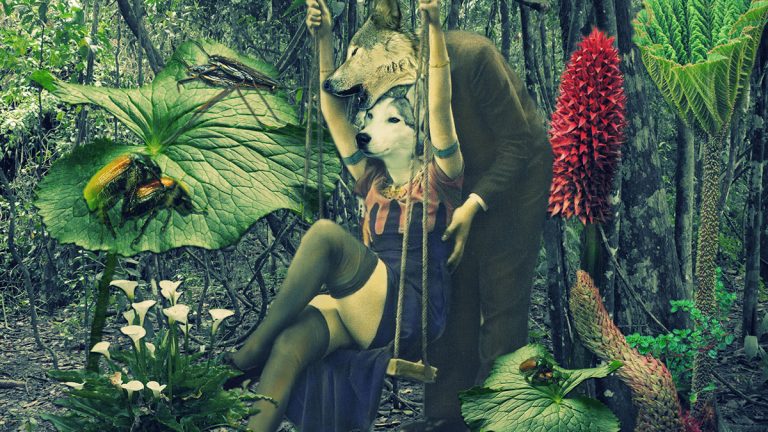The grotesque skeleton of a rotting fish lies next to the sub-human’s feet as this New Life Unfolding figure contemplates crossing a river to confront two scowling Maori tribesmen. “Do not come here,” they warn. “Your destiny lies in your own near-extinct world.”Disaster again looms in the doomed La Ville Fantome. Skyscrapers menaced by a giant reptile, towering plants emerge from a spreading torrent of quicksand. It is the end of contemporary life. Dali would love playing in this tenuous, ever-fluctuating universe of environmental cataclysms, magical reality, imaginary beings, levity and wonder. He’d feel quite at home in Disturbia, this land of twisting ambiguities, enigmatic juxtapositions, mutating plants, and voluptuous women with deer heads. Seekers of the Imaginarium, that liberating, cosmic haunt of psychic and supernatural spirits would be equally enamored with Stéphanie Cousin’s visual deviltry. Stirred by surrealism and Max Ernst’s urge to “redo reality,” this Swiss deconstructionist with a love for nature and piano playing octopuses, is bent on arousing our senses.

Metaphysical in nature, and exuberantly fluid, her digital collages and video animations smash through orthodoxy. They insightfully take us past taboos to realms unknown. But beware! Her revelatory journeys are captivating and unsettling. An existential dream sequence, featuring noir erotica and bedeviling transmutations, Watching Alice heralds being in limbo. A video featuring Nick Cave music, it spirits Alice to an octopus-dwelling kingdom where her destiny remains unknown.“I like mysteries, the work of Paul Auster, and hopefully my art, its fragments and speculations, get people to think,” muses Cousin, once a photo editor at magazines who long felt constrained by Swiss conventions. Discovering PhotoShop in 2002, and “playing with images,” she combines mechanical devices, wispy smoke, women in control, and “lots of motion” with absurdist imagery.

“I love the dark, the unexplained, filmmakers like Jim Jarmusch (The Dead Don’t Die), and David Lynch (Twin Peaks),” admits Cousin, speaking about Watching Alice and its parade of deers, skeletal fish and lascivious scenes.“I’m not scared by animal heads, Nature’s strength. The fish, flowers, and creatures in my videos are a softening element… There is loneliness in the city… many Alices in dark rooms. Cities will fall…we are killing ourselves..”In The Girl Who Disappears, a video fable about loneliness and mutation, Cousin pictures the transformative power of the sea, lightning, and wildlife. It’s another stark reminder that humanity is fragile, living on the edge of extinction. But not all is dystopian. A luminous pink rose grabs our attention, hinting redemption is still possible.
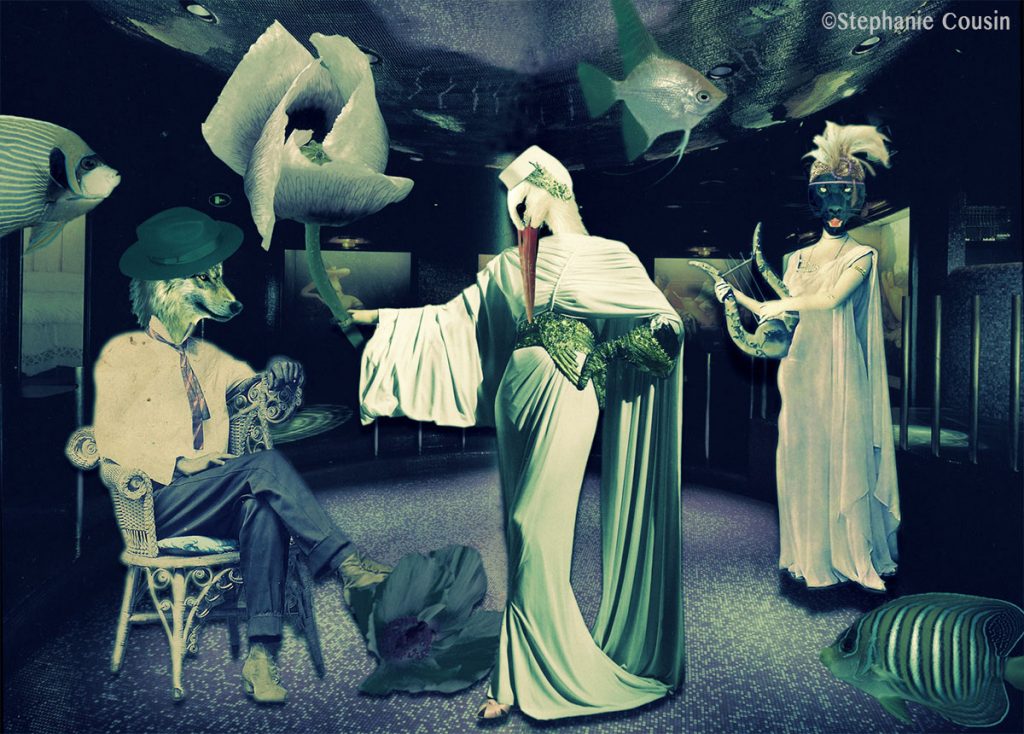
Cousin’s videos draw on relationships she formed by taking photographs at Zurich music concerts. That frenetic world became her “coming out party.” Being alone is a recurrent theme in her work, and she confesses, “I was sad, very shy. I was so isolated.”Initially hesitant to take photos of people, to expose herself, she eventually became more adventurous. She met numerous musicians in Zurich, and interned at a New York photo agency.“It was exciting to manipulate images, to play with contrasts,” says Cousin,“ who apprenticed to refine her craft.“One teacher encouraged me to do (picture) collages,” she recalls. “It was my very first step into what I am doing now.”Stirred by Man Ray and his “freeing himself from the one dimensionality of paint” (he used color block compositions in his photography), Cousin combined fragments to tell piercing stories. Digital collages allowed her to explore light, Nature, and to venture into surrealistic constructions. She probed “unreal situations,” and contrasted images to create the “mysterious.”
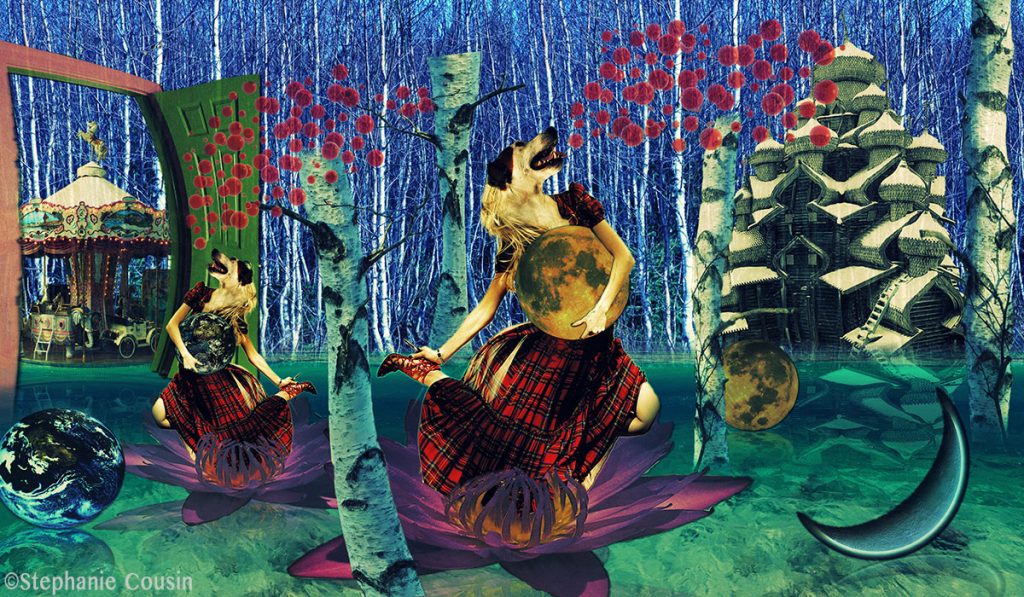
Juxtaposing dissimilar elements, Man Ray turned the familiar into the strange, if not totally bizarre. Cousin follows suit. Her Racines transforms worms into objects of affection, enriching a sensuous woman with fertility. In the tender Bees and Flowers, a digital collage that pays homage to Nature’s supremacy, Cousin charmingly composes a fairytale return to Paradise. A friend lost a son to suicide, and this digital tribute, enlivened by sparkling light and shimmering trees, is “an antidote to death.”A plea for life, Monde Tombe depicts our world sliding into an environmental abyss. The dogs are howling. Trees are ominously bare. “There is fear here,” says Cousin, emphatically. “I like animals more than people.”Instead of Death, there is Life in Fuck Off. It celebrates liberation, girls being defiant, unpredictable and daring.
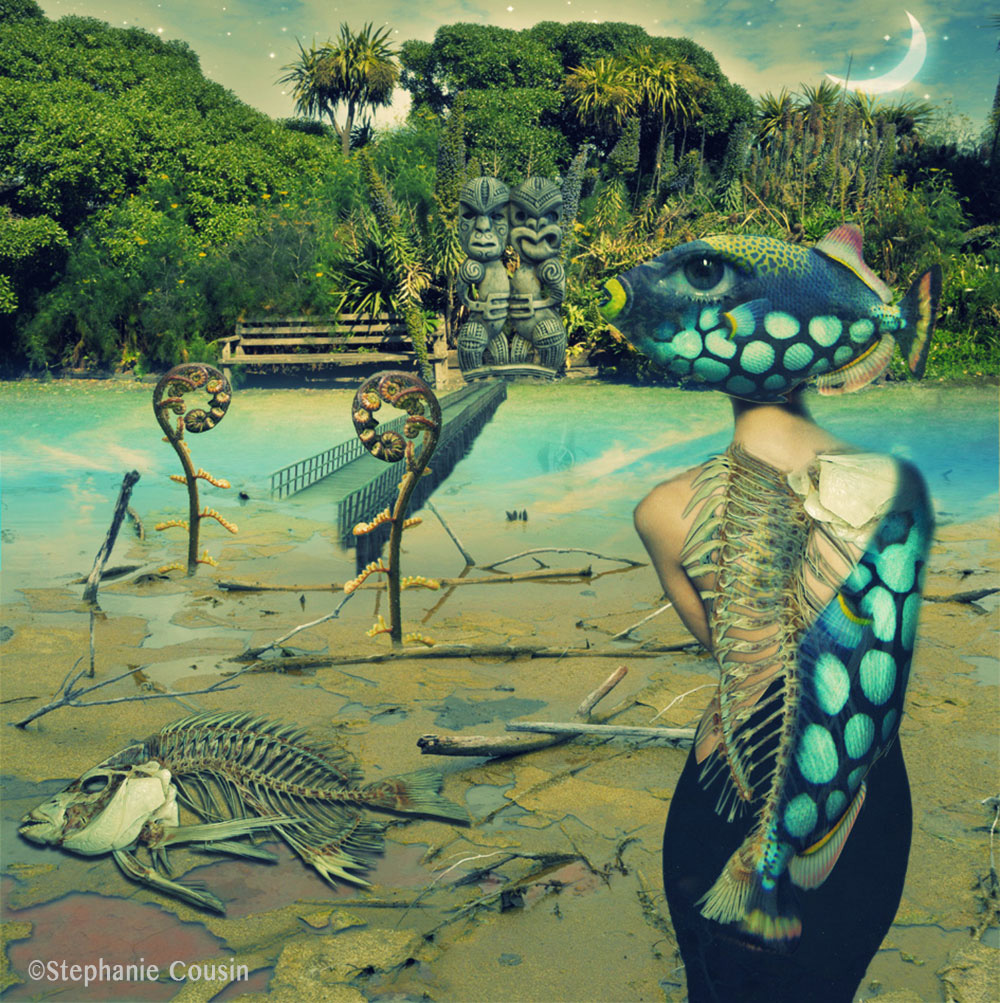
Ghostly female spirts demand emancipation in the elaborately-composed La Danse De La Femme Cigogne (is that David Lynch in the chair?). Dali’s influence is apparent in the complex, thought-provoking Feuille, Caillou, Ciseau. A groping hand, a penetrating eye overlooking a preposterously-sized plant, scissors cutting through the mist, all portend the Ominous. Our day of reckoning, a return to primeval origins. We can only be saved by “running” with wolves.“Giving humans animal heads, deer heads, that connects them to Nature,” explains Cousin, whose visuals are starkly infused with sub-humans.“The wolf is dangerous, but danger can be good. I like wolves…I want to be more wild. I want to unleash my hidden emotions.”
Unfettered desire is explored in such collages as Bringing the World to a Better Place, Haven in the Woods, and La Balancoire (like many of Dali’s work, all feature animals). Woman is free, and she surrenders to her wildest erotic impulses.
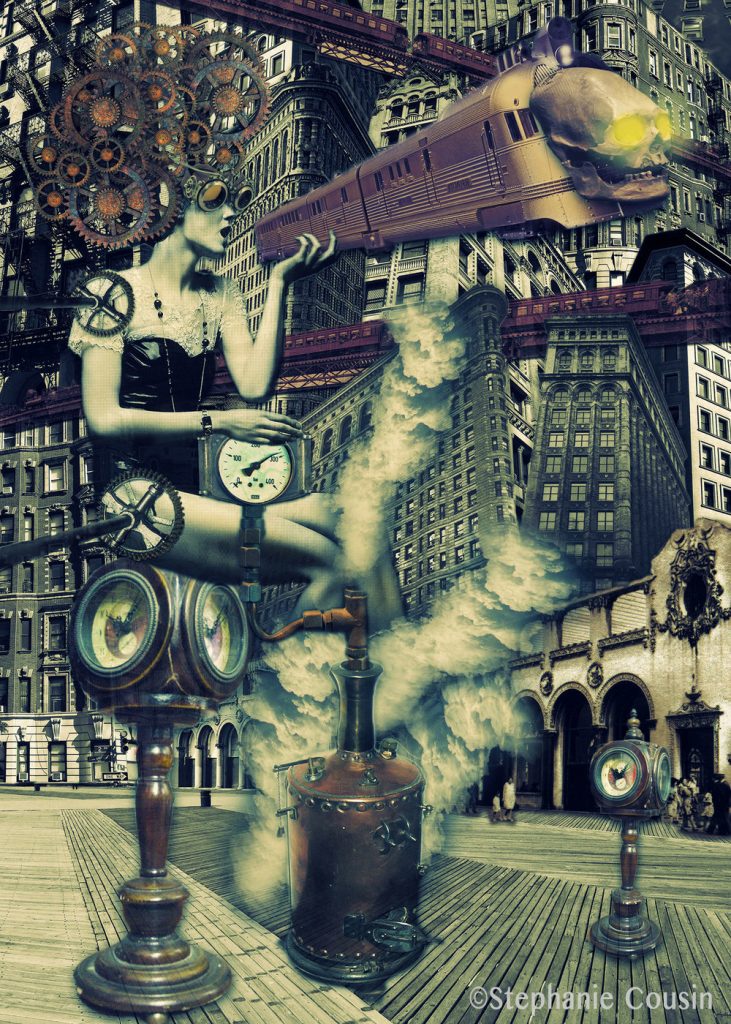
Some women choose to go Home. Worried that collages lacked the visual intensity to capture “everything that lies dormant within us,” Cousin has focused more on video animations since 2012. Home underscores that emotional release–a woman fleeing to the forest to discover her true identity among deers and immersive wildlife. At home, she is totally in control.
Confronted by demons, the Virgin Mary, and flying witches, Miss Punching Ball is on her way home, to the Garden of Eden. Before entering Cousin’s realm of luxuriant flowers, singer Martine Corbat sits seductively in a bathtub, sings “Aujourd’hui”, and watches fighters tussling in a ring. Unwilling to be a “pinata,” she too will fight. She must. Transformation, seizing the power to be a liberated woman, demands a song, floating on a leaf, and fending off ghosts.“Women keep getting punched,” rues Corbat. “But our dreams, imagination, sensuality and mystery are strong. Cousin knows this. Like any woman fighting to be free, Stephanie’s universe is limitless.”
Written By Edward Kiersh

